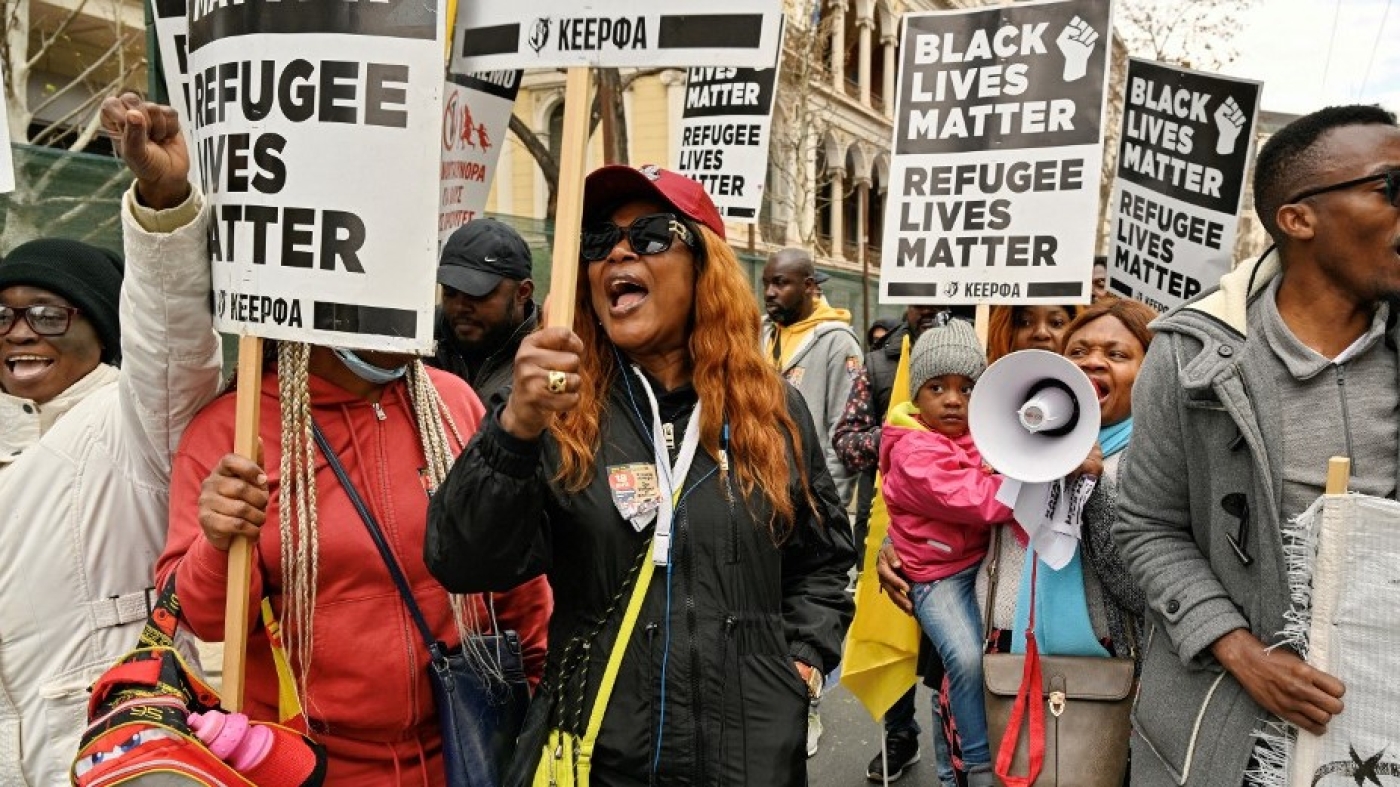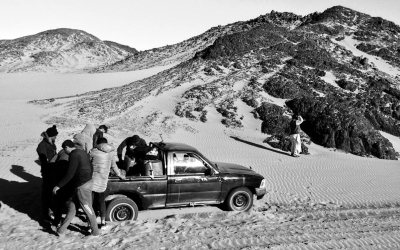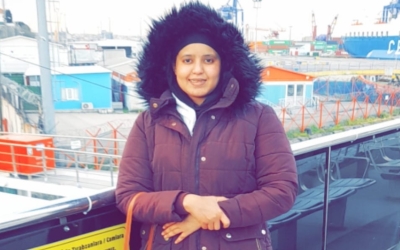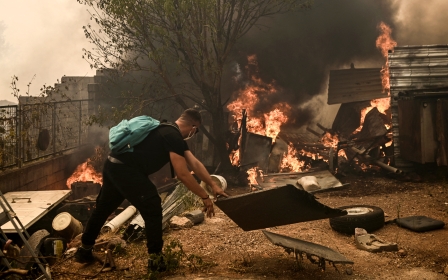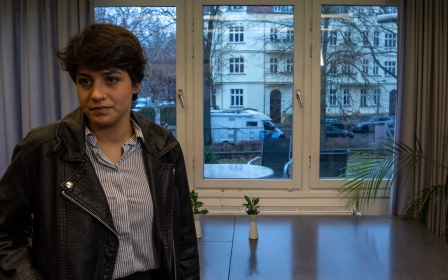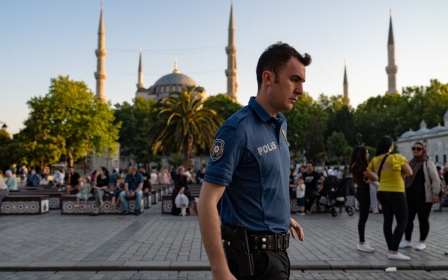Women asylum seekers in Europe caught between pushbacks and smuggler abuse
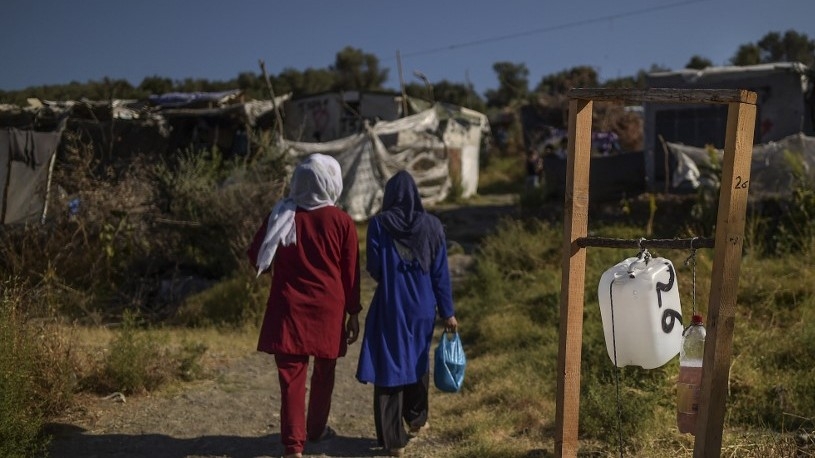
In February 2020, Shirin found herself in a hotel lobby in Edirne, Turkey. The 28-year-old Iranian was the only single woman among a group of asylum seekers trying to cross the border to Greece.
Shirin, not her real name, was the only asylum seeker at the hotel, and was later raped by the smuggler, who had decided who would stay with him at the hotel.
"After a time, when you come out of this situation, you recognise: I wasn't the first one, and I will not be the last one," Shirin told Middle East Eye from Germany, where she lives.
"If you are a single woman on the move and without a male companion, it will 100 percent happen to you."
Reports by rights groups and research organisations indicate that what happened to Shirin is not an isolated incident, but reflects a broader pattern.
New MEE newsletter: Jerusalem Dispatch
Sign up to get the latest insights and analysis on Israel-Palestine, alongside Turkey Unpacked and other MEE newsletters
Between January and September 2022, 91 percent of female survivors of sexual violence supported by Doctors Without Borders (MSF) on the Greek island of Samos reported they were travelling alone, according to a report by the group.
Likewise, a paper by the Women's Refugee Committee in 2019 reported that 90 percent of the women and girls who participated in the study were raped at some point during their journeys from North Africa to Italy.
Sexual violence is an increasing risk on all asylum routes, whether via the central Mediterranean or the western Balkans, although comprehensive data is hard to find.
All migrants - men, women and children - are at risk of being sexually assaulted. Men have more difficulty discussing their experiences. But the greatest risks are for women and girls, especially those who are single, have disabilities, and/or identify as from a sexual minority.
Our field research, supported by the Investigative Journalism for Europe, showed that migrant women who have fled sexual assault are likely to end up in a cycle of sexual violence, at the hands of different perpetrators including smugglers, human traffickers, border guards and others.
According to critics, this is all enabled by the European border system, which they say adopts systematic and violent pushbacks of refugees and has increasingly pushed refugees and irregular migrants to expose themselves to high risks, including sexual violence, to enter Europe.
Smuggled from Turkey
Prior to leaving Iran in 2020, Shirin feared persecution from her family, was afraid of gender-based violence and felt unprotected by the state. Members of her family accused her of having an extra-marital relationship, contrary to strict religious rules in Iranian society.
In spring 2017, her mother warned Shirin by telephone that the family was looking for her and that she should not go home. A day later, on 8 March, her mother was murdered by unknown assailants.
Before her death, Shirin's mother told her that members of the family had obtained pictures of Shirin with her male partner, as well photos of Shirin in international media, protesting in front of Tehran's Evin prison in January 2017 in support of jailed activist Arash Sadeghi.
Shirin said the prosecutor tasked with investigating her mother's murder failed to do so properly and closed her case.
Later, Shirin's brother was charged with his own mother's murder, although Shirin is still not sure that he was responsible. "My brother told my aunt in a phone call that he is on death row, and is very scared since he regularly sees other inmates being taken away for execution," she told MEE.
Desperate for safety and dignity, and not knowing where she was going, Shirin headed to Turkey. Iranians nationals do not need a visa to enter Turkey.
"I felt that I could not stay silent any more, and that at any moment I could get killed too," she said. "I did not have an idea how the system worked. I needed the closest safe place from my country. I did not want to be that far from Iran."
Upon arrival in Turkey, she filed an asylum claim with the UN refugee agency (UNHCR) and the Turkish immigration office, and was granted refugee status based on gender-based persecution.
But her protection was only temporary. In September 2018, the Turkish authorities reassessed decisions made by the UNHCR, including Shirin's, since Ankara does not recognise gender-based violence as grounds for asylum.
Shirin lost her status, forcing her to embark on a dangerous journey to Europe, organised by smugglers. She was refused entry at the Turkish-Greek border six times by Greek border guards and severely beaten. She has filed a complaint with the United Nations Human Rights Committee about the incidents.
Shirin first attempted to cross into Greece in February 2020 when, she said, the smuggler raped her twice in a hotel that she described as luxurious. She stayed there for five days without identification papers. Then she was moved into a house with other refugees, where she said she had no privacy. She said that the smuggler initially treated her nicely, but after taking advantage of her he moved her with other asylum seekers.
"Somehow you are in a situation where you cannot run and you don't know the way," she said. "You don't know anything. You don't want to make any complaints. You want to be a nice one as much as possible to only achieve what you want, that moment to survive."
Escaping Iran
On a hot day in Athens, Maryam, which is not her real name for reasons of safety, spoke to MEE at the Diotima Centre for Gender Rights and Equality, a women's non-profit organisation.
She is a beneficiary of the project GBV Prevention and Response Services, run by Diotima Centre for Gender Rights and Equality with the support of UNHCR - Greece.
The project provides protection for the refugee population, particularly those who have suffered gender-based violence or are at high risk, through legal aid and awareness-raising activities and training.
Maryam, 37, arrived in Greece in early 2020, during the Covid-19 pandemic. She is originally from the minority Lur tribe in Lorestan province, western Iran.
She moved to Tehran on her own in 2005 at 19 after her family banned her from leaving home or going to work or school.
"But my family did not stop chasing me," she said, particularly after finding out that she had a boyfriend, which is a social taboo.
"I got pregnant while in a relationship with my boyfriend. So I did not feel safe, and had to flee Iran in 2016. I was not getting safety from the government, my family or society. I felt inferior, vulnerable, and insulted as a woman."
Maryam contacted a smuggler via an acquaintance. She began her asylum journey as a single woman, leaving her six-year-old son behind in Iran.
"I was fearing for his safety, but believing we would be reunited later," she said.
Horror of asylum route
Maryam described her crossing from Turkey to Greece as "the most horrific movie," as she and a group of asylum seekers travelled across forests, cliffs and mountains.
"I've watched many horror movies, but that was the most horrific movie happening in my life," she told MEE.
"It's not a straight path. It's bushes, it's cliffs, it's mountains. You go up, you go down. If you don't go down, they [smugglers] push you down ... I had to eat leftover food ... I went unconscious at some point."
But the horror did not end when Maryam crossed the border: it was only the beginning. "When I entered Athens I thought the first hell was over, and that I had reached paradise. But the second I arrived, hell started," she said.
In the Greek capital, Maryam's first smuggler handed her over to another, an Iranian, who rented a "luxury house" for them in southern Athens and locked her inside for a month
"I was subjected to sexual and physical assault and threats every day," she said.
Maryam was determined to escape, but it was tough. It was in 2020, the world was locked down due to Covid-19, and her identification papers had been seized by the smuggler.
Eventually, Maryam managed to rent a bed through a telegram group of Iranians in Greece, using one of the stolen phones her smuggler kept at home. She then managed to escape the house.
"The moment he came to the house, I started breaking things and shouting. He was scared that the neighbours would come or call the police because of all this noise, since he knew he was guilty," she said. So he let Maryam go.
She then started to learn about the asylum process, and was able to get her sister and other trusted family members to send her money and pictures for her passport, essential if she wanted to rent somewhere to live, which Diotima helped her with.
Two years later, she heard through an acquaintance that the Greek army had raided the house where the Iranian smuggler stayed and detained him.
'A structural problem'
Nikola Kovacevic, a human rights lawyer from Serbia, said that gender-based violence is often a consequence of pushback operations by Greek border authorities against asylum seekers.
Pushbacks at the Greek-Turkish borders are a common tactic used by the Greek coastguards, backed by the European Union, in order to push refugees away from entering Europe.
"A pushback, by its very nature, is very informal, and one of the major problems it generates is not only sexual and gender-based violence, but all forms of violence," he told MEE.
An estimated €819m ($883m) has been allocated to Greece by the EU to cover border control from 2021 to 2027. But asylum-seeker disappearances and deaths are common during pushbacks and have increased since 2020.
The lack of registration and formal status before being granted refugee status also makes female refugees more vulnerable to exploitation and less able to prosecute their attackers.
"It's not only about something committed by the smugglers or by the border guards, but also the way the authorities deny these people the possibility to be identified, to be registered, to be assessed," Kovacevic said.
He points out that pushbacks at European borders under the justification of combating "illegal" migration and trafficking have allowed organised crime groups to flourish.
"Pushbacks will not decrease smuggling or illegal migration," he said. "They just increase the prices of smuggling and the risks to which asylum seekers are willing to expose themselves to get to the place where they will be able to enjoy the human rights they have been deprived of back home."
The asylum route through Greece and southeastern Europe, known as the "Western Balkan Route", remains a pathway for many refugees heading further into the continent.
According to the Border Violence Monitoring Network, Greek border guards violate EU migration policy laws through systematic illegal pushbacks and methods of violence, torture, and property theft to drive refugees away.
In a landmark case, on 16 January this year, the European Court of Human Rights ordered Greece to pay €80,000 to the family of Syrian refugee Belal Tello after Greek coastguards were found complicit in his murder when firing bullets on his boat near the eastern Aegean island of Pserimo in 2014.
With crossing the border unsafe, many asylum seekers are forced to turn to smugglers if they want to reach Europe. Often, this possibility contributes to a dependent relationship between the asylum-seeker and the smuggler, Shirin said.
"It's not just a smuggler problem. It's a structural problem. My experience was with four smugglers: one of them was a monster, but the other three were normal humans who helped me, and thanks to them really I ended up here safe.
"Politicians are best placed to solve this problem because they indirectly empower the smuggler to resort to violence. But most of the blame is placed on the smugglers and migrants, rather than policymakers, who are complicit in this crime."
Shirin is now working in Germany and has obtained her refugee status there after three years of waiting. She describes herself as "a feminist".
When asked about her present identity, Shirin said she is still trying to recover from her border-crossing ordeal. "I don't have future plans yet."
As for Maryam, who describes herself as a "strong woman", she now works in Greece, is completing her doctoral studies and has been joined by her son, who has just turned 14.
"I am doing my best to be okay for my son. I think I've blossomed like a flower here."
This article is available in French on Middle East Eye French edition.
Middle East Eye delivers independent and unrivalled coverage and analysis of the Middle East, North Africa and beyond. To learn more about republishing this content and the associated fees, please fill out this form. More about MEE can be found here.


